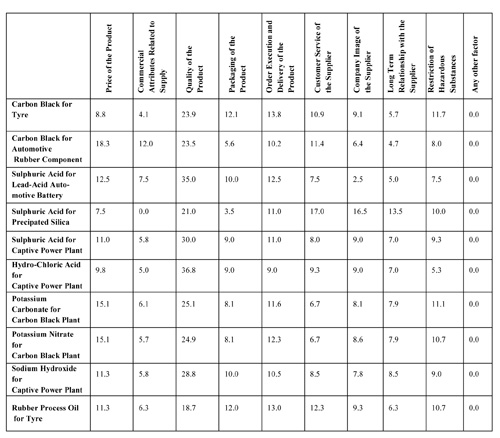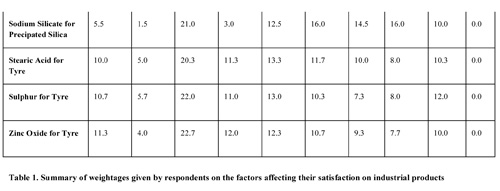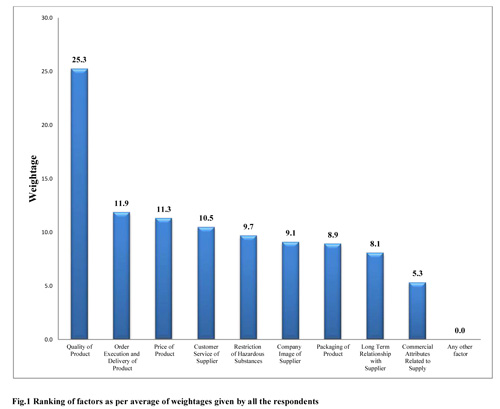Subscribe now to get notified about IU Jharkhand journal updates!
Factors affecting satisfaction of customers in business to business context
Abstract :
In order to gain competitive advantage, it is imperative to focus on the needs and preferences of customers. The central purpose of this study is to analyze the factors that affect satisfaction of industrial customers. Particularly, a case study approach is employed whereby the study seeks to gain information from the views of Indian customers of industrial products. The instruments of data collection involved administering structured questionnaire and also conducting interviews as deemed convenient. The sampling frame consisted of 184 industrial customers in India who procure different products for their use as raw material.
From the results, it is evident that the factor which plays the most significant role in shaping customer satisfaction involves the Quality of the product. Whereas the factor to which minimum weightage was given by majority of the respondents is commercial attribute i.e. credit terms, discount etc. The degree of significance of rest of the factors investigated was found to vary from one customer to another customer.
These factors include Price, Packaging, Order execution and delivery, Customer service, Company image of the supplier, Long term relationship with the supplier, Restriction of hazardous substances in the product. No other factor apart from the aforesaid ones was suggested by the respondents which can influence their satisfaction.
Keywords :
Industrial Customers, Customer Satisfaction, Industrial Products.1. Introduction
Customer satisfaction plays a critical role in enhancing brand loyalty. It enables companies to retain the existing customer bases as well as to attract new consumer groups from marketplaces. In the current business world, companies need to work meticulously with current and potential customers. They need to be continuously in touch, as customer segment, market necessities and expectations change dynamically. Decision making process in case of industrial customers, as opposed to consumers, involves several people. There are some key decision makers who take the purchase decision. While identifying satisfaction factors of industrial customers, availability of literature is found not as adequate as with consumers. The present study is an attempt to analyze the significance of different factors to influence the satisfaction of customers of various industrial products with their suppliers. Particularly, a case study approach is employed whereby the study seeks to gain information from the views of customers of different products. This study aims to give insight to the industrial chemical producing companies to serve their customers in a better way.
2 Literature Review
While going through the literatures available on the topic under study, it is observed that the availability of literatures on customer satisfaction for industrial products is not as adequate as that for consumer products. From the existing literatures available on the subject, an effort has been made to identify the factors which play important role in satisfying industrial customers.
As per Berry (1995), the relational bonds, categorized as financial, social and structural bonds are considered to be important in securing customer loyalty. Joseph, Prof. Milna Susan and Unnikrishnan, Ms. Anusree(2016) suggested that the financial bonds should not be treated as the only mechanism for customer retention because it can be easily imitated. The use of social bonds and structural bonds are found to be more effective to achieve customer retention in B2B context
Homburg and Rudolph (2001) proposed a model where satisfaction of industrial customers is measured by seven different dimensions such as satisfaction with product, sales people, product-related information, order handling, technical services, interaction with internal staff and complaint handling
As per Einar,W. and Hirsch, Aaby(2011), one of the main issues that separate industrial customers from consumers is that the decision process often is a process involving several people. The different roles in the customer organization influence overall customer satisfaction. For those responsible for purchasing, the commercial aspects were more important than product-related information, while the engineers emphasized the importance of the product-related information over the commercial issues
As per Narasimhan, P L (2015), customers in industrial markets are professionally trained and technically qualified. Purchasing decisions are made on the basis of compliance of specification, cost effectiveness and dependability of the supply. Functional benefits involving product design characteristics, aspects are attractive to technical personnel. Operational benefits related to product attributes such as reliability and consistency are important to manufacturing and quality control people. Financial benefits i.e. favorable credit terms and cost saving opportunities are important to purchasing managers. Profits from customer relationships can be increased by acquiring new customers, enhancing the profitability of existing customers and extending the duration of customer relationship
From the literature survey it is observed there is hardly any in-depth analysis on customer satisfaction for industrial products. However, this literature survey helps in developing the background for identification of factors which influence customer satisfaction for industrial products.
3. Objectives
From the review of existing literatures available on the subject and from twenty five years’ industrial experience of the research scholar, following nine factors have been identified which can influence customer satisfaction for industrial products:
i. Price of the product
ii. Commercial attributes (credit terms, discounts etc.)
iii. Quality of the product
iv. Packaging of the product
v. Order execution and delivery of the product
vi. Customer service of the supplier
vii. Company image of the supplier
viii. Long term relationship with supplier
ix. Restriction of hazardous substances in the product.
The research objective developed on the above background is as follows:
a) To analyze the significance of different factors influencing the customer satisfaction for industrial products
b) To compare weightages given to customer satisfaction factors for different industrial products
4. Methodologies
In order to identify the significance of various factors on the satisfaction of different customers, survey method was adopted.
- The instruments of data collection involved administering pre-tested structured questionnaires and also conducting interviews as deemed convenient. Given the resource constraint and time limitation on the part of the researcher, mailed questionnaires were also used
- Questionnaire was prepared to know the views of industrial customers of various chemical products on the significance of following factors i.e. Quality, Price, Commercial attributes (credits, discounts etc.), Packaging, Order execution and delivery, Customer service, Company image of the supplier, Long term relationship with the supplier, Restriction of hazardous substances in the product to influence their satisfaction with the supplier
- The sampling frame consisted of 184 (one hundred and eighty four) industrial customers from industries like Tyre, Automotive Rubber Component (ARC), Lead –Acid Battery, Captive power plants, Precipitated Silica, Carbon Black who procure industrial chemical products viz. Sulphuric Acid, Hydrochloric Acid, Sodium Hydroxide, Zinc Oxide, Stearic Acid, Sulphur, Potassium Carbonate, Potassium Nitrate, Carbon Black in India
- Indeed, participants were selected through simple random sampling
- The inclusion criterion was that the participants were expected to have minimum qualification of graduation and have industrial working experience of at least one year so that they are better placed to identify business factors that might have boosted their satisfaction levels and also shaped their buying behaviors
- Regarding the process of analyzing data, the study relied on descriptive and inferential statistics that paved the way for the presentation of the results in the form of statistical tables, graphs, and charts
- Imperative, secondary data was used from the previous literature to complement primary data outcomes
- From an ethical perspective, the information collected was analyzed and presented in its original form without the researcher’s interference and manipulation that could have, otherwise, yielded biased outcomes
- Lastly, participant anonymity and data privacy and confidentiality were ensured by avoiding the use of the participants’ revealing information.
5 Results and Discussion
As mentioned earlier, the purpose of this study was to unearth the significance of the identified factors that affect customer satisfaction for industrial products. The weightages given to these different factors by the respondents from different industries were compiled and the average of weightages given to particular factor by different respondents from a particular type of industry e.g. Tyre, Battery etc. is taken and all these averages are presented in the following table. The following results highlight the weightages given to different factors by industrial customers of various products.



6 Interpretations
From Table1, it is observed there is a difference in the preferences of satisfaction factors among customers of different industrial products. It is evident from the graphs (Fig.1) on the average of weightages given by all the respondents that the factor which plays the most significant role in shaping customer satisfaction in general, involves the Quality of the product. Whereas the factor to which minimum weightage was given by majority of the respondents is Commercial Attribute i.e. credit limit, credit period, discount etc. The degree of significance of rest of the investigated factors was found to vary from one customer to another customer. These factors include Price, Packaging, Order execution and delivery, Customer service of the supplier, Company image of the supplier, Long term relationship with the supplier, Restriction of hazardous substances in the product. No other factor, apart from the aforesaid ones, was suggested by the respondents which can influence their satisfaction.
7 Conclusions
From the results, it is evident that the customers of industrial products do not want to compromise on quality for price or any other factor. It is also observed that they are less willing to get the incentives in their purchasing process as evident from the lowest weightage given to commercial attributes. For major customer like Tyre manufacturers, price of industrial products is fixed on long term basis and in many cases price of the product for these customers is linked to the raw material price. On the contrary, smaller organizations like small manufacturers of automotive rubber components (ARC) search for comparatively lower price. Packaging (i.e. cleanliness, consistency in weight, leakage-free packing etc.) of the industrial product is given importance by majority of the customers, particularly those like Tyre companies, who is in close watch of their own customers in terms of audit, visit etc. Restriction of hazardous substances e.g. lead, mercury, cadmium, hexavalent chromium, PAH etc. is a matter of concern for almost all the industries. Order execution and delivery has been given importance by most of the respondents as it is directly related to the production at their end. There is difference in opinion among the respondents on the significance of Company Image of the supplier in influencing their satisfaction. No other factor, apart from the aforesaid ones, was suggested by the respondents which can influence their satisfaction. That means all the respondents are in agreement that the factors, as described above, cover all their expectations from their supplier.
8 Managerial implication of the study
Study revealed that there is a difference in the preferences of satisfaction factors among customers of different industrial products. Thus suppliers have to prioritize the factors for satisfying the customers of their specific product and formulate their action plan to satisfy these customers. In the future, there is a need to examine how pull factors affect customer satisfaction, as well as some of the challenges faced by the marketing teams of these products in their quest to ensure that their organizations attract and retain customers. Decision making process in case of industrial customers, as opposed to consumers, involves several people in different roles. Individuals in one role may have different goals, perceptions, and expectation from those in the other role. In the future, there is a scope to study the views of people from different functions of customers’ organization on the customer satisfaction factors and how it affects their overall buying behavior.
- Joseph, Prof. Milna Susan; Unnikrishnan, Ms. Anusree (2016). Relationship Bonding Strategies and Customer Retention: A Study in Business To Business Context. IOSR Journal of Business and Management (IOSR-JBM) e-ISSN. 2278-487Xwww.iosrjournals.org, p-ISSN: 2319-7668 PP 38-44.
- Visnjic Kastalli, I.; Van Looy, B. (2013). Servitization: Disentangling the Impact of Service Business Model Innovation on Manufacturing Firm Performance. Journal of Operations Management 31(4): 169-180.
- O'Cass, Aron; Ngo, Liem Viet (2012). Creating superior customer value for B2B firms through supplier firm capabilities. Journal of Operations Management 41(1): 125-135.
- Einar,W.; Hirsch,Aaby(2011). Customer Satisfaction in a High-Technology Business-to-Business Context, Reprosentralen. Universitetet i Oslo.
- Cater,Tomaz ; Cater, Barbara(2010). Product and relationship quality influence on customer commitment and loyalty in B2B manufacturing relationships. Industrial Marketing Management39(8): 1321-1333.
- Gil‐Saura,Irene; Frasquet‐Deltoro,Marta; Cervera‐Taulet,Amparo (2009).The value of B2B relationships, Industrial Management & Data Systems. Vol. 109 Issue: 5, pp.593-609, https://doi.org/10.1108/ 02635570910957605.
- Kong, Shin Yee (2008). Customer perceived quality, relationship quality and business loyalty: An example of B2B organization[ Diss]; University of Malaya.
- Doney,Patricia M.; Barry, James M.; Abratt,Russell(2007). Trust determinants and outcomes in global B2B services. European journal of marketing. Vol.41, Issue 9 / 10, pp.1096-1116.
- Rauyruen, Papassapa ; Miller, Kenneth E.(2007). Relationship quality as a predictor of B2B customer loyalty. Journal of Business Research 60 (1): 21-31.
- Blombäck,Anna; Axelsson,B.(2007). The role of corporate brand image in the selection of new subcontractors, Journal of Business & Industrial Marketing, Volume 22, Number 6, pp.418–430.
- Homburg, Christian & Rudolph, Bettina (April, 2001). Customer Satisfaction in Industrial Markets: Dimensional and Multiple Role Issues. Journal of Business Research, Elsevier, 52(1), pp.15-33.
- Berry,L.L.(1995) Relationship Marketing of Services—Growing Interest, Emerging Perspectives. J.A.M.S. 23, 236–245. https://doi.org/10.1177/009207039502300402
